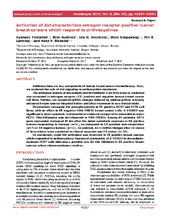| dc.contributor.author | Yndestad, Synnøve | en_US |
| dc.contributor.author | Austreid, Eilin | en_US |
| dc.contributor.author | Svanberg, Ida | en_US |
| dc.contributor.author | Knappskog, Stian | en_US |
| dc.contributor.author | Lønning, Per Eystein | en_US |
| dc.contributor.author | Eikesdal, Hans Petter | en_US |
| dc.date.accessioned | 2018-05-04T08:12:56Z | |
| dc.date.available | 2018-05-04T08:12:56Z | |
| dc.date.issued | 2017-04-17 | |
| dc.identifier.issn | 1949-2553 | |
| dc.identifier.uri | https://hdl.handle.net/1956/17686 | |
| dc.description.abstract | Anthracyclines are key components of human breast cancer chemotherapy. Here, we explored the role of Akt signaling in anthracycline resistance. The antitumor activity of doxorubicin and Akt inhibitor A-443654 alone or combined was examined in estrogen receptor (ER) positive and negative human breast cancer cell lines. Further, we examined mRNA changes induced by anthracyclines in locally advanced breast cancers biopsied before and after treatment in two clinical trials. Doxorubicin increased Akt phosphorylation in ER positive MCF7 and T47D cell lines, with no effect in ER negative MDA-MB231 breast cancer cells. A-443654 was significantly more cytotoxic in doxorubicin-resistant compared to doxorubicin-naïve MCF7. This difference was not observed in MDA-MB231. Among 24 patients, AKT1 gene expression increased 24 hrs after the initial epirubicin exposure in ER positive tumors responding to therapy (n=6), as compared to ER positive non-responders (n=7) or ER negative tumors (n=11). In contrast, AKT1 mRNA changes after 16 weeks of doxorubicin were unrelated to clinical response and ER status (n=30). In conclusion, rapid Akt activation was observed in ER positive breast cancers which responded to anthracyclines. Increased cytotoxicity of A-443654 in doxorubicinresistant MCF7 cells indicates a possible role for Akt inhibitors in ER positive breast cancers where chemoresistance evolves. | en_US |
| dc.language.iso | eng | eng |
| dc.publisher | Impact Journals | eng |
| dc.relation.ispartof | <a href="http://hdl.handle.net/1956/17687" target="blank"> The role of PTEN, PI3K-Akt-mTOR signaling and pseudogene PTENP1 in breast cancer</a> | |
| dc.rights | Attribution CC BY | eng |
| dc.rights.uri | http://creativecommons.org/licenses/by/3.0/ | eng |
| dc.title | Activation of Akt characterizes estrogen receptor positive human breast cancers which respond to anthracyclines | en_US |
| dc.type | Peer reviewed | |
| dc.type | Journal article | |
| dc.description.version | publishedVersion | en_US |
| dc.rights.holder | Copyright Yndestad et al. | |
| dc.identifier.doi | https://doi.org/10.18632/oncotarget.17167 | |
| dc.identifier.cristin | 1497359 | |
| dc.source.journal | OncoTarget | |
| dc.source.40 | 8 | |
| dc.source.14 | 25 | |
| dc.source.pagenumber | 41227-41241 | |

